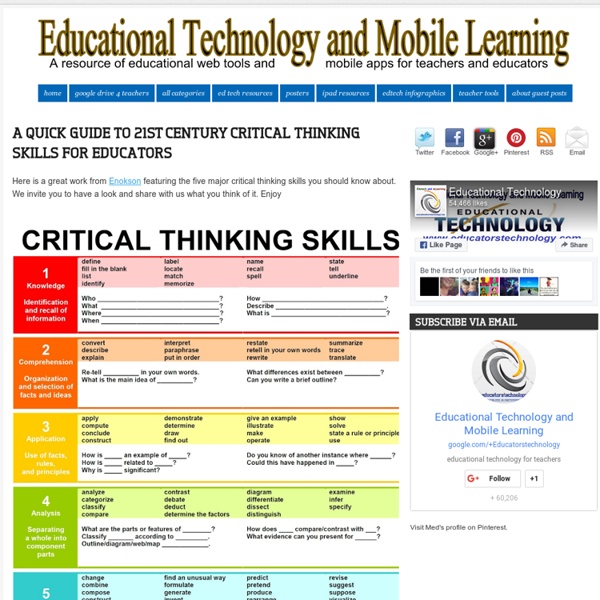



Educational Technology Buzzwords Jul 22 Thanks to Boundless and Getting Smart for putting together and sharing this great infographic outlining the latest trends in Educational technology. It helps to cut through all the buzzwords flying around and pinpoint what we may or may not be incorporating in our learning and teaching. It also gets me thinking a lot about educational technology and brings up a lot of questions. Do we need this many technology based eystems in the current education climate? Education buzzwords have for a long time driven me insane as we spend our lives in schools latching on to phrase after phrase that tries to make us sound more knowledgeable without actually being more knowledgeable. Clearly from reading this blog, you would know I have great hopes for the impact educational technology can have on learning and teaching.
Economists Do It With Models — Warning: “graphic” content… Tips 4 teaching | Ideas for teachers, new and old… Mrs. Treichler's Wikispace - Padlet Skip to main content Create interactive lessons using any digital content including wikis with our free sister product TES Teach. Get it on the web or iPad! guest Join | Help | Sign In Mrs. guest| Join | Help | Sign In Turn off "Getting Started" Loading... Quick and Dirty Tips™ One of the most frequent questions I’m asked is whether it’s acceptable to end a sentence with a preposition. I know many of you were taught that you shouldn’t end a sentence with a preposition, but it’s a myth. In fact, I consider it one of the top ten grammar myths because many people believe it’s true, but nearly all grammarians disagree, at least in some cases (1, 2, 3, 4, 5, 6, 7, 8). So before I lose you, let's back up. What Is a Preposition? A preposition is a word that creates a relationship between other words. When Can a Sentence End with a Preposition? Here's an example of a sentence that can end with a preposition: What did you step on? I can hear some of you gnashing your teeth right now, while you think, “What about saying, 'On what did you step?'” I've read long arguments about why it's OK to end sentences with prepositions when the preposition isn't extraneous, but the driving point still seems to be “Normal people don't talk that way.” [Where you at?] Cover Letter Grammar
RT Handouts Bloom’s Taxonomy 2.0 | Once a Teacher.... Over the few months that I’ve been blogging, my post on Bloom’s Digital Taxonomy has been the biggest hit. And, what interests my readers interests me. Here’s more on the subject: Probably every classroom teacher in this country has at least come across Bloom’s Taxonomy at some point. Knowledge –> Comprehension –> Application –> Analysis –> Synthesis –> Evaluation We’ve come to associate certain action words, activities, and types of questions with each level, and we know that the higher the level, the more challenging the approach. Enter: Bloom’s revised Taxonomy, ca. 2001, by Lorin Anderson. During the 1990′s, a former student of Bloom’s, Lorin Anderson, led a new assembly which met for the purpose of updating the taxonomy, hoping to add relevance for 21st century students and teachers. Let’s look at the original and the revised versions side-by-side: “The graphic is a representation of the NEW verbage associated with the long familiar Bloom’s Taxonomy. Like this: Like Loading...
The Teacher’s Quick Guide To Pinterest The following article is by Julie Delello of the University of Texas at Tyler. She can be reached at jdelello[at]uttyler.edu if you have any questions or comments. Children learn social skills by interacting freely with peers. Playgrounds provide an opportunity for children from different classrooms to interact and enhance skill development. For some, the relatively new social network site Pinterest has become a virtual playground allowing users to “pin” inspiring images from around the web. As a new teacher, it’s easy to become overwhelmed trying to create motivating lessons while managing the responsibilities within the classroom. Pinterest, created in 2009 and launched in March of 2010, has been ranked 10th out of the top visited social networking sites across the world, allowing users to search for pins with a specific theme or subject. Getting Started Pinterest is straightforward and doesn’t require a lot of technological experience to get started. Set up an account. References